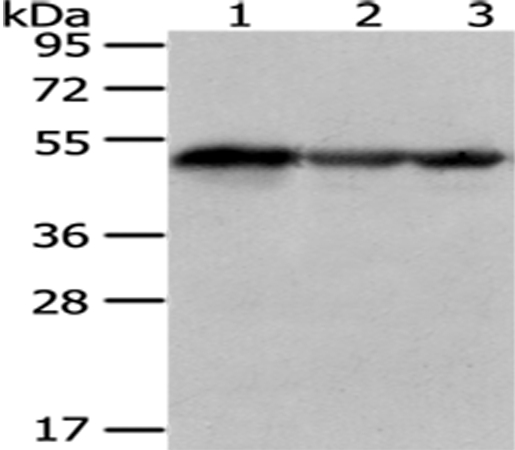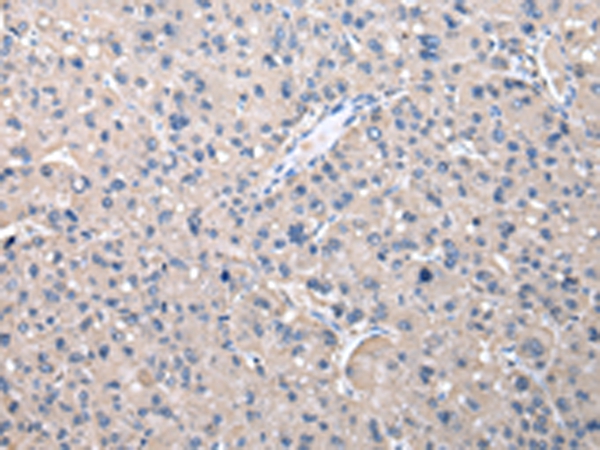


| WB | 咨询技术 | Human,Mouse,Rat |
| IF | 咨询技术 | Human,Mouse,Rat |
| IHC | 1/25-1/100 | Human,Mouse,Rat |
| ICC | 技术咨询 | Human,Mouse,Rat |
| FCM | 咨询技术 | Human,Mouse,Rat |
| Elisa | 咨询技术 | Human,Mouse,Rat |
| Aliases | KYNUU |
| Entrez GeneID | 8942; |
| WB Predicted band size | 52kDa |
| Host/Isotype | Rabbit IgG |
| Antibody Type | Primary antibody |
| Storage | Store at 4°C short term. Aliquot and store at -20°C long term. Avoid freeze/thaw cycles. |
| Species Reactivity | Human |
| Immunogen | Fusion protein of human KYNU |
| Formulation | Purified antibody in PBS with 0.05% sodium azide. |
+ +
以下是关于KYNU(犬尿氨酸酶)抗体的3篇参考文献及其摘要内容的简要概括:
---
1. **文献名称**: *Kynurenine pathway metabolism and cancer immunosurveillance*
**作者**: Opitz, C.A. et al.
**摘要**: 该研究探讨了KYNU在肿瘤微环境中的代谢作用,发现其通过降解色氨酸代谢产物促进免疫逃逸。研究使用特异性KYNU抗体进行免疫组化分析,证实其在多种肿瘤组织中高表达,并与T细胞功能抑制相关。
---
2. **文献名称**: *Kynureninase expression in Alzheimer's disease brains*
**作者**: Baranowska-Bik, A. et al.
**摘要**: 通过Western blot和免疫荧光技术(使用KYNU抗体),研究发现阿尔茨海默病患者脑组织中KYNU水平显著升高,可能与神经炎症及淀粉样β蛋白沉积导致的神经毒性相关。
---
3. **文献名称**: *Targeting kynureninase in cancer therapy: Antibody-based inhibition*
**作者**: Zhang, Y. et al.
**摘要**: 研究开发了一种高特异性KYNU单克隆抗体,体外实验显示其能有效阻断犬尿氨酸通路,抑制肿瘤细胞增殖并增强化疗敏感性,为靶向代谢的癌症治疗提供新策略。
---
4. **文献名称**: *Hepatic kynureninase dysregulation in liver fibrosis*
**作者**: Liu, T. et al.
**摘要**: 利用KYNU抗体分析肝纤维化模型,发现KYNU在肝星状细胞中异常激活,促进促纤维化因子分泌,提示其作为肝病治疗潜在靶点。
---
这些文献覆盖了KYNU在肿瘤、神经退行性疾病及肝病中的功能研究,并涉及抗体在机制探索或治疗开发中的应用。如需具体文献链接或补充其他内容,可进一步说明。
The KYNU antibody is designed to target kynureninase (KYNU), a key enzyme in the kynurenine pathway of tryptophan metabolism. KYNU catalyzes the conversion of kynurenine and 3-hydroxykynurenine into anthranilic acid and 3-hydroxyanthranilic acid, respectively. This pathway plays a critical role in regulating immune responses, neurotransmitter synthesis, and energy production, with dysregulation linked to neurodegenerative disorders, cancer, and inflammatory diseases. KYNU itself has garnered attention for its dual role: while essential for maintaining metabolic homeostasis, its overexpression or dysfunction may contribute to pathological conditions, such as neuroinflammation in Alzheimer’s disease or immune evasion in tumors.
KYNU antibodies are primarily used in research to detect and quantify protein expression in tissues or cell lines via techniques like Western blot, immunohistochemistry, and ELISA. They help investigate KYNU's spatial distribution, activity modulation, and interactions with other pathway components. Recent studies also explore KYNU as a potential therapeutic target or biomarker, particularly in cancers where tryptophan metabolism influences immune checkpoint mechanisms. Commercially available KYNU antibodies are often validated for specificity and sensitivity, though variability in isoforms and post-translational modifications necessitates careful experimental optimization. Overall, these tools advance understanding of KYNU's biological impact and its relevance to human health.
×